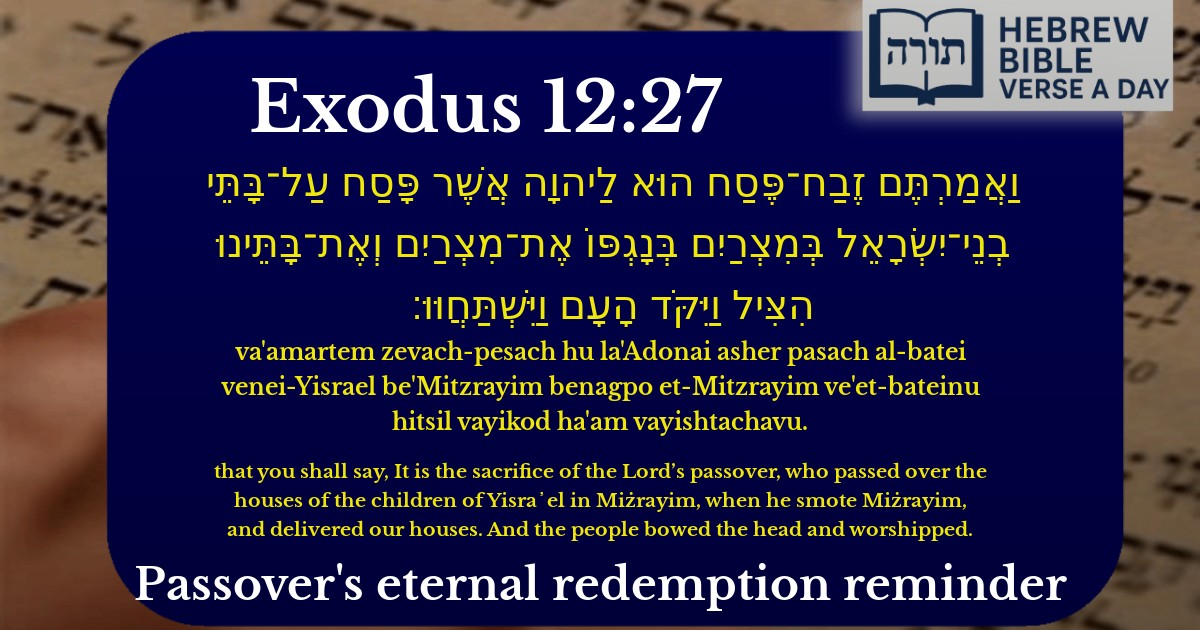Join Our Newsletter To Be Informed When New Videos Are Posted
Join the thousands of fellow Studends who rely on our videos to learn how to read the bible in Hebrew for free!
Hebrew Text
וַאֲמַרְתֶּם זֶבַח־פֶּסַח הוּא לַיהוָה אֲשֶׁר פָּסַח עַל־בָּתֵּי בְנֵי־יִשְׂרָאֵל בְּמִצְרַיִם בְּנָגְפּוֹ אֶת־מִצְרַיִם וְאֶת־בָּתֵּינוּ הִצִּיל וַיִּקֹּד הָעָם וַיִּשְׁתַּחֲוּוּ׃
English Translation
that you shall say, It is the sacrifice of the Lord’s passover, who passed over the houses of the children of Yisra᾽el in Miżrayim, when he smote Miżrayim, and delivered our houses. And the people bowed the head and worshipped.
Transliteration
Va'amartem zevach-pesach hu la'Adonai asher pasach al-batei venei-Yisrael be'Mitzrayim benagpo et-Mitzrayim ve'et-bateinu hitsil vayikod ha'am vayishtachavu.
Hebrew Leining Text
וַאֲמַרְתֶּ֡ם זֶֽבַח־פֶּ֨סַח ה֜וּא לַֽיהֹוָ֗ה אֲשֶׁ֣ר פָּ֠סַ֠ח עַל־בָּתֵּ֤י בְנֵֽי־יִשְׂרָאֵל֙ בְּמִצְרַ֔יִם בְּנׇגְפּ֥וֹ אֶת־מִצְרַ֖יִם וְאֶת־בָּתֵּ֣ינוּ הִצִּ֑יל וַיִּקֹּ֥ד הָעָ֖ם וַיִּֽשְׁתַּחֲוֽוּ׃
וַאֲמַרְתֶּ֡ם זֶֽבַח־פֶּ֨סַח ה֜וּא לַֽיהֹוָ֗ה אֲשֶׁ֣ר פָּ֠סַ֠ח עַל־בָּתֵּ֤י בְנֵֽי־יִשְׂרָאֵל֙ בְּמִצְרַ֔יִם בְּנׇגְפּ֥וֹ אֶת־מִצְרַ֖יִם וְאֶת־בָּתֵּ֣ינוּ הִצִּ֑יל וַיִּקֹּ֥ד הָעָ֖ם וַיִּֽשְׁתַּחֲוֽוּ׃
🎵 Listen to leining
Parasha Commentary
📚 Talmud Citations
This verse is quoted in the Talmud.
📖 Pesachim 96a
The verse is referenced in the discussion about the laws of the Passover sacrifice and the historical context of the Exodus from Egypt.


The Meaning of "Zevach Pesach" (The Passover Sacrifice)
The verse describes the Korban Pesach (Passover sacrifice) as "זֶבַח־פֶּסַח" – a sacrifice commemorating Hashem's act of "פָּסַח" (passing over) the houses of Bnei Yisrael in Egypt. Rashi explains that the term "Pesach" refers to Hashem skipping over the Jewish homes during the plague of the firstborn, sparing them while striking the Egyptians. The Mechilta adds that this demonstrates divine precision in judgment, distinguishing between Israel and Egypt.
The Dual Nature of the Miracle
The verse mentions two aspects of the Exodus event:
The People's Response of Worship
The conclusion of the verse states: "וַיִּקֹּד הָעָם וַיִּשְׁתַּחֲוּוּ" – the people bowed and prostrated themselves. Ramban explains this as an expression of gratitude and recognition of Hashem's miracles. The Talmud (Pesachim 96b) connects this bowing to the mitzvah of recounting the Exodus, showing that proper acknowledgment of miracles leads to worship.
The Korban Pesach as an Eternal Symbol
The Rambam (Hilchot Korban Pesach 1:1) emphasizes that this sacrifice serves as a perpetual reminder of our redemption from Egypt. The verse's phrasing "וַאֲמַרְתֶּם" (you shall say) teaches, according to the Chizkuni, that each generation must verbally declare the significance of the Pesach sacrifice, ensuring the transmission of the Exodus story to future generations.